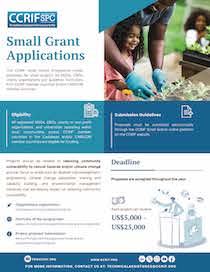Grand Cayman, Cayman Islands, November 17, 2020. CCRIF will make a payout of US$10.7 million to the Government of Nicaragua following the passage of Tropical Cyclone Eta. As is customary and part of the Facility’s customer proposition, all payouts are made within 14 days of the event. Indeed, CCRIF has already paid an advance of US$3.7 million to the Government of Nicaragua, with the remainder to be paid by November 19, following verification of the final model results.
Both the country’s tropical cyclone and excess rainfall parametric insurance policies were triggered due to TC Eta. Eta was the 29th and most powerful tropical cyclone of the 2020 Atlantic Hurricane Season and made landfall in Nicaragua as a category 4 hurricane, bringing catastrophic winds, storm surge and rainfall.
Since its inception in 2007, CCRIF has made a total of 47 payouts to 14 of its member governments, totalling approximately US$174 million. CCRIF’s payouts provide quick liquidity to governments immediately following a natural disaster, allowing them to address their most immediate needs. CCRIF’s assessments on the use of payouts have shown that over 2.5 million persons have benefitted from CCRIF payouts, which have been used by governments over the years to provide food, water, medication and shelter for the most vulnerable in their populations, and for immediate repair to damaged roads and other critical infrastructure, among other uses.
On the announcement of the payout, Nicaragua’s Minister of Finance and Public Credit, His Excellency Iván Acosta commented, “We want to extend our recognition for the excellent work by the team of CCRIF SPC, for their effectiveness in their mission to serve the peoples of Central America and the Caribbean in their moments of greatest need, such as when they face a climatic or catastrophic event.”
This is Nicaragua’s third payout from CCRIF. Previous payouts have been US$1.1 million following Tropical Cyclone Otto in November 2016 and US$500,000 for an earthquake in June of that year. Nicaragua was the first Central American country to join CCRIF, doing so immediately following the signing in 2015 of a Memorandum of Understanding (MOU) between CCRIF and the Council of Ministers of Finance of Central America, Panama and the Dominican Republic (COSEFIN). While CCRIF was established for Caribbean governments, this MOU enabled Central American countries to join the Facility. Two other Central American governments – Guatemala and Panama – also are members of CCRIF.
According to the preliminary assessments provided by Nicaragua’s National Disaster Prevention System (SINAPRED), Hurricane Eta generated much damage and destruction as it passed through northern Nicaragua, severely affecting the country’s North Caribbean Coast Autonomous Region. Reports from local and regional sources indicated that Hurricane Eta resulted in over 1,700 homes being affected, with 803 partially damaged and 77 destroyed; 1,500 families being evacuated; 30,000 people accessing shelters with some subsequent damage to shelters caused by high winds; interruptions of electric power that affected approximately 50,000 persons; the municipalities of Waspam and Puerto Cabezas being cut off due to the overflow of the Wawa River; and many other communities being affected by flooding.
TC Eta affected to a lesser extent five other CCRIF member countries in Central America and the Caribbean: Guatemala, Belize, the Cayman Islands, Jamaica, and The Bahamas.
The 2020 Atlantic Hurricane Season, which will end on November 30, is the most active Atlantic hurricane season on record in terms of the number of tropical cyclones – so far recording 30 named storms, 13 hurricanes, and 6 major hurricanes – and, along with the 2005 season, is the only hurricane season to feature the Greek letter storm-naming system. Also, whilst the hurricane season officially starts on June 1 each year, the 2020 season witnessed pre-season cyclones Arthur and Bertha on May 16 and 27 respectively.
2020 has been an extraordinary year globally, and moreso for countries in the Caribbean and Central America, which are not only grappling with the effects of COVID-19 but also with the impacts of climate change. CCRIF member governments have been confronted with the dual effects of increasing damage and loss due to the frequency and intensity of tropical cyclones as well as a range of socioeconomic impacts as a result of COVID-19, all within the context of diminishing fiscal space and a not so positive economic outlook.
As part of its response to the COVID-19 pandemic, CCRIF engaged early in the year with the donor community to access support for its members. Consequently, the Facility’s international development partners stepped forward to support member governments to cover portions of their CCRIF parametric insurance costs for the 2020/21 and 2021/22 policy years. The European Union provided a grant of €10 million (US$11 million) to CCRIF for premium support or increasing coverage for its Caribbean members, the Central America and Caribbean Catastrophe Risk Insurance Program Multi-Donor Trust Fund provided a grant of up to US$10 million to COSEFIN member countries for premium support for policy years 2020/21 and 2021/22, and the Canada-CARICOM Climate Adaptation Fund provided funding of US$12.4 million to seven Caribbean CCRIF members to cover a portion of their parametric insurance premium costs and to two potential members if they joined CCRIF. CCRIF also provided its member governments with a 5 per cent discount on gross premium for tropical cyclone coverage and a further discount of 15 per cent on additional coverage purchased for increased tropical cyclone and/or earthquake coverage for the 2020/21 policy year.
In reflecting on the impacts of the 2020 Hurricane Season and specifically Tropical Cyclone Eta, CCRIF CEO, Mr. Isaac Anthony, stated, “CCRIF extends sympathies to the Government and people of Nicaragua for the losses incurred due to Tropical Cyclone Eta and as well as to our other member governments and other countries that were impacted by this event. The Facility stands ready to support the governments affected in their immediate recovery and longer-term rehabilitation efforts”.
About CCRIF SPC:
CCRIF SPC is a segregated portfolio company, owned, operated and registered in the Caribbean. It limits the financial impact of catastrophic hurricanes, earthquakes and excess rainfall events to Caribbean and Central American governments by quickly providing short-term liquidity when a parametric insurance policy is triggered. It is the world’s first regional fund utilising parametric insurance, giving member governments the unique opportunity to purchase earthquake, hurricane and excess rainfall catastrophe coverage with lowest-possible pricing. CCRIF was developed under the technical leadership of the World Bank and with a grant from the Government of Japan. It was capitalized through contributions to a Multi-Donor Trust Fund (MDTF) by the Government of Canada, the European Union, the World Bank, the governments of the UK and France, the Caribbean Development Bank and the governments of Ireland and Bermuda, as well as through membership fees paid by participating governments. In 2014, a second MDTF was established by the World Bank to support the development of CCRIF SPC’s new products for current and potential members and facilitate the entry of Central American countries and additional Caribbean countries. The MDTF currently channels funds from various donors, including: Canada, through Global Affairs Canada; the United States, through the Department of the Treasury; the European Union, through the European Commission, and Germany, through the Federal Ministry for Economic Cooperation and Development and KfW. Additional financing has been provided by the Caribbean Development Bank, with resources provided by Mexico; the Government of Ireland; and the European Union through its Regional Resilience Building Facility managed by the Global Facility for Disaster Reduction and Recovery (GFDRR) and The World Bank.
English





